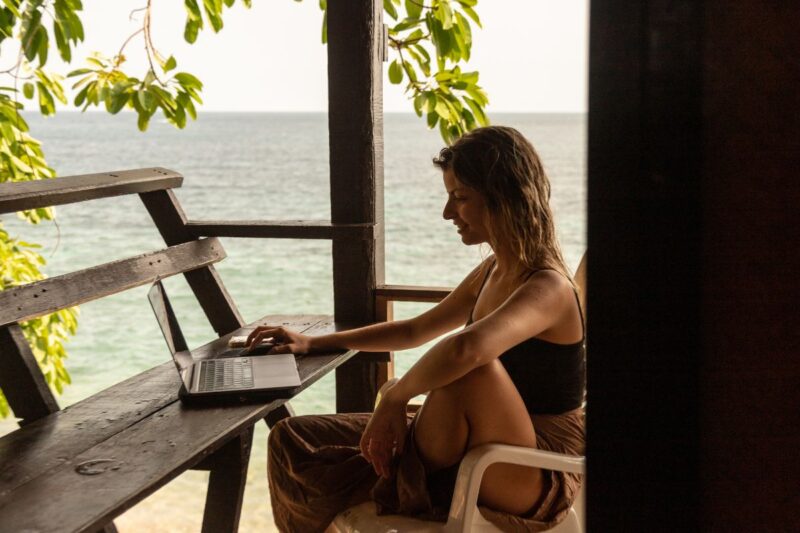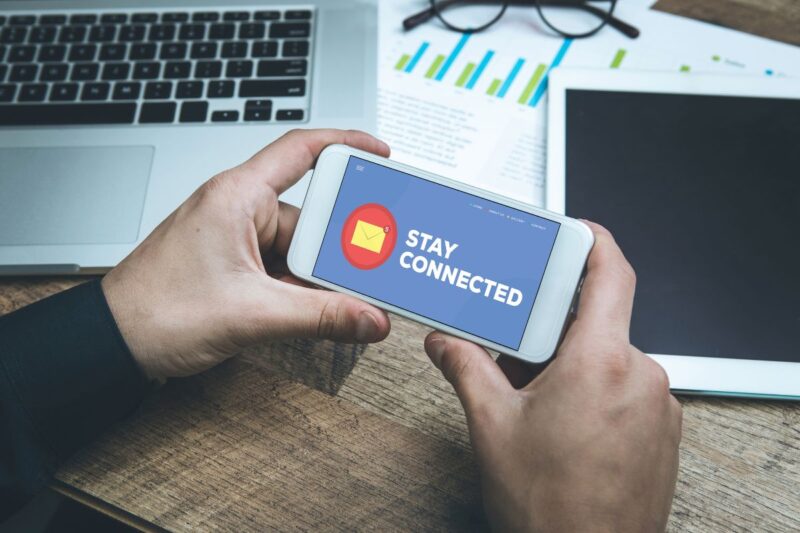So you’re new here? And you’re dreaming of having that digital nomad lifestyle? It’s exciting, but getting started can feel a bit overwhelming.
Don’t worry! I’ve been there. And in this ultimate guide, I’ll show you how to become a digital nomad. Here are important tools and resources that helped me begin and made me who I am as a Filipino remote worker!

1. The First Step: Setting Up Your Remote Work
Before you hit the road, the first thing you need is a remote job. It’s not all neck pillows, water bottles and travel journals after all!
There are many resources for a Filipino remote worker that can help you find job opportunities or online business.
Some popular roles include web developer, freelance writer, or virtual assistant.
Here are some platforms I’ve used:
- Upwork: A global platform where you can find freelance jobs in different fields like graphic designer or social media manager.
- OnlineJobs.ph: A platform just for Filipinos! You can find full-time or part-time work here, and it’s a great starting point for your nomadic lifestyle.
- Fiverr: Known for its gig-based system, Fiverr allows you to create service packages that clients can purchase. It’s ideal for showcasing your specific skills, such as graphic design, content writing, or video editing.
- LinkedIn: More than just a networking site, LinkedIn features a dedicated job board where you can find remote positions across industries. LinkedIn allows you to build your professional network, which can lead to referrals and job offers.
- Toptal: If you’re an experienced professional in fields like software development, design, or finance, Toptal connects you with high-quality clients and projects. It’s a more selective platform, but the potential for well-paying, long-term gigs makes it worth exploring.
- Freelancer: Similar to Upwork, Freelancer offers a wide range of projects across multiple categories. You can bid on jobs, enter contests, and connect with clients worldwide. It’s a great platform for building experience and securing consistent work.
- We Work Remotely: Specializing in remote positions, this platform features jobs in design, marketing, customer support, and tech. It’s an excellent resource for finding roles that are fully remote, offering flexibility and a global client base.
Once you land your remote job, you’re already one step closer to starting your digital nomad journey.
2. Digital Nomad Tools to Stay Productive
Getting one of the digital nomad jobs is not enough. As a freelancer, staying organized is key. Here are some must-have tools that I rely on:
- Trello: This tool helps you manage your projects, tasks, and deadlines all in one place. I use it to keep track of everything, from work assignments to personal travel plans.
- Notion: This is my go-to tool for note-taking, creating to-do lists, and storing all my travel info.
- Google Drive: Cloud storage is essential. I store all my important documents here, so they’re always accessible, no matter where I am.
- Slack – For staying connected with clients, remote teams, or collaborators, Slack is a game-changer. It streamlines communication and allows file sharing, making it easier to work across time zones.
- Canva – A user-friendly design tool for creating presentations, social media content, and marketing materials. As a freelancer, this helps me maintain a professional edge without needing advanced design skills.
- Clockify – Time management is crucial when working remotely. I use Clockify to track how much time I spend on projects, helping me stay efficient and avoid burnout.
- Grammarly – Whether it’s emails, proposals, or blog posts, Grammarly ensures my writing is polished and professional. It’s an invaluable tool for anyone whose work relies on clear communication.
- NordVPN – A VPN is non-negotiable for digital nomads. NordVPN secures my internet connection, protecting sensitive data when using public Wi-Fi in cafes or coworking spaces.
- Zoom – Essential for virtual meetings and client calls, Zoom ensures I can maintain professional relationships no matter where I’m working from.
- Expensify – Managing finances can be tricky on the go. Expensify helps me track expenses, manage receipts, and even simplify tax preparation.
These tools have become my digital Swiss Army knife, helping me manage work seamlessly, whether I’m in Metro Manila, El Nido, or exploring the beaches of Sri Lanka.

3. Reliable Internet is a Must
Aside from the 4-hour workweek plan or schedule, another one of the biggest challenges for any nomadic lifestyle employee is finding reliable internet connection.
Southeast Asia is a popular hub because of its affordable cost of living and decent internet access (Yesim code: KATRIN8414).
- Pocket Wi-Fi – I always carry a pocket Wi-Fi device as a backup, especially when I’m in remote areas or island hopping in places like El Nido or Palawan. It’s a lifesaver when local connections are spotty, and many providers now offer affordable, travel-friendly plans.
- Co-working Spaces – Cities like Chiang Mai, Hong Kong, Kuala Lumpur, and Metro Manila are known for their excellent co-working spaces equipped with fast and reliable Wi-Fi. These spaces also offer opportunities to network with fellow digital nomads and remote professionals.
- Yesim – Local prepaid SIM cards are another great option for staying connected. Here’s one of my favorites so don’t forget to use my code: KATRIN8414 for a good discount!
- High-Speed Internet Providers – Some accommodations, especially in larger cities, now offer packages with high-speed internet, catering to the growing community of remote workers and digital nomads. When booking, always check the reviews for internet reliability to avoid surprises.
- Cafés with Internet Access – If you prefer a more relaxed setting, many cafes in popular digital nomad hubs have free Wi-Fi and comfortable workspaces. Just remember to support the business by ordering food or drinks while you work.
4. Visa and Residency Options
If you’re planning to stay in a foreign country long-term, travel or health insurance isn’t enough to have. Check out visa options for a digital nomad.
Many countries offer a digital nomad visa or tourist visa with extensions for any remote worker.
Here are some great destinations for Filipinos to consider:
- Chiang Mai, Thailand: Known as a digital nomad hotspot, Chiang Mai offers affordable living, excellent co-working spaces, and a visa system that’s relatively easy to navigate. You can start with a Tourist Visa (Single-Entry or Multiple-Entry) and extend it at local immigration offices. For longer stays, consider the Education Visa for studying Thai language.
- Sri Lanka: Sri Lanka combines affordability with a growing remote work culture. The country offers a Tourist ETA (Electronic Travel Authorization) that can be extended, making it a great choice for digital nomads.
- Hong Kong: A vibrant and bustling city, Hong Kong is perfect for digital nomads who thrive in urban environments. While there’s no specific digital nomad visa yet, you can apply for a Hong Kong Working Holiday Visa (if eligible) or a standard visitor visa with the possibility of renewal.
Additional Resources
Here are some helpful links to explore visa and residency options:
- Immigration Websites: Always refer to official government websites to get up-to-date visa and residency information.
- Global Citizen Solutions: A resource for those considering investment-based residency or citizenship options.
If you plan to stay even longer, consider looking into permanent residency or citizenship options in the country you love. This can make it easier to settle down while enjoying your digital nomad life.
5. Staying Connected and Safe
Being a Filipino digital nomad also means staying connected.
And trust me, it doesn’t just mean the usual Facebook groups, blog posts and digital nomad communities. It also means keeping in touch with our family and friends.
Also, I always make sure to have travel insurance for safety, especially during long trips abroad.
Here are the apps I use to stay connected with my loved ones and work:
- Viber: Viber is a favorite for Filipinos because of its user-friendly interface and robust features. You can send free text messages, make voice and video calls, and even share photos and videos. The group chat feature is especially helpful for staying in touch with multiple family members or friends at once.
- WhatsApp: Popular worldwide, WhatsApp is a versatile app for texting, voice messages, and video calls. Its end-to-end encryption ensures your conversations remain private, which is a bonus for keeping your personal updates secure.
- Facebook Messenger: Many Filipinos rely on Facebook Messenger because it’s widely used and integrates seamlessly with Facebook. It’s perfect for sending quick updates, sharing photos, and even hosting group video calls with family back home.
- Zoom: While commonly used for work, Zoom is also an excellent tool for hosting virtual family gatherings or catching up with friends across different time zones.
- collaborate professionally:
- Slack: Slack is a top choice for team communication. You can create separate channels for different projects or clients, share files instantly, and integrate it with other productivity tools like Google Drive or Trello. It’s perfect for keeping your work organized and your team on the same page.
- Skype: Skype remains a widely used platform for professional calls, particularly for formal meetings, interviews, and presentations. Its screen-sharing feature is especially handy for collaborative discussions or walkthroughs.
- Microsoft Teams: For those working with corporate clients or larger teams, Microsoft Teams is a powerful tool. It combines chat, video conferencing, and document collaboration in one platform.
- Google Meet: Integrated with Google Workspace, Google Meet is a reliable tool for virtual meetings. Its ease of use and compatibility with Gmail make it a convenient option for freelancers and remote workers.
Joining Digital Nomad Communities
Staying connected also means engaging with other digital nomads who can share tips, advice, and even potential job leads. Platforms like Nomad List and Reddit offer vibrant communities where you can connect with like-minded individuals. For Filipinos, groups like Pinoy Digital Nomads on Facebook provide a space to share experiences and support each other.
By leveraging these tools, you can ensure you’re never too far from the people who matter most while staying efficient and connected in your professional life. Communication is the heart of a successful digital nomad journey, keeping you grounded and supported wherever your travels take you.

Final Thoughts
Starting a digital nomad journey can feel a bit scary. But with the right digital nomad resources, or some tool and skill, you’ll be well-prepared to succeed.
Just remember, being organized and staying connected are key. So grab your laptop, pack your bags, and get ready for an amazing adventure!
Happy travels, fellow digital nomads!
FAQ
Digital nomads typically enter the Philippines using a tourist visa, which allows stays of up to 30 days and can be extended for up to 36 months. There’s currently no specific digital nomad visa, but the long-term tourist visa is a popular choice.
Other soft skills like adaptability, creativity and resourcefulness, problem solving will get a whole new meaning for you as a digital nomad holding a business degree. And time management and critical thinking will be good support acts to help you working online. You’re going to be your own boss out there.
One of the biggest draws of the Digital Nomad Visa is its attractive tax treatment: Exemption from Local Income Tax: Income earned outside the Philippines is generally exempt from local income tax. This means the Philippine government won’t typically tax your earnings from remote work with foreign entities.

